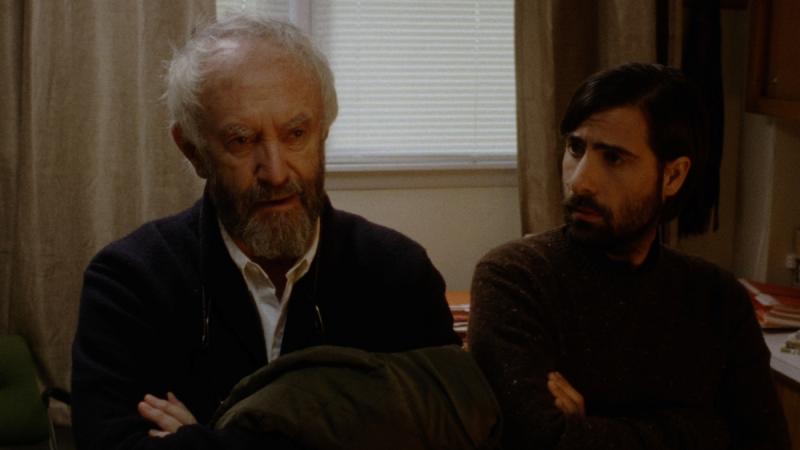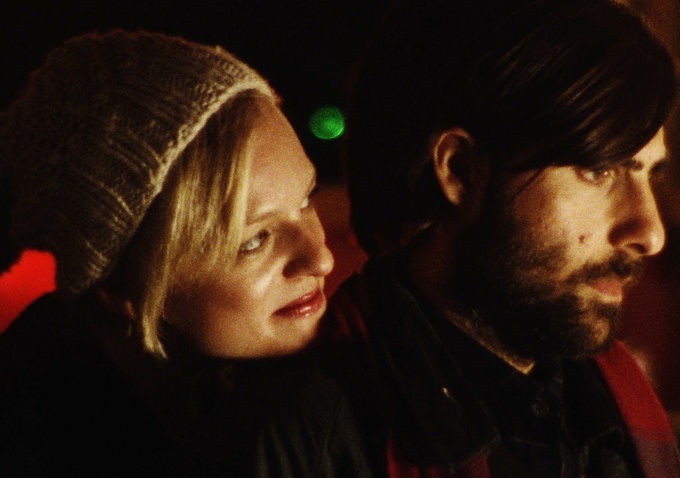Listen Up Philip | reviews, news & interviews
Listen Up Philip
Listen Up Philip
Jonathan Pryce and Jason Schwartzman as literary men behaving badly

Artists can be selfish bastards. Yoko Ono didn’t pay her babysitters; Bob Dylan has frozen out nearly all his friends; Norman Mailer stabbed his wife, and William Burroughs shot his. Philp (Jason Schwartzman), the young novelist who sociopathically meanders through Alex Ross Perry’s new film, causes no fatalities. Which is where his positive qualities peter out.
 Perry had Woody Allen’s Husbands and Wives in mind as he filmed, admiring its chaotic, hand-held camera intensity and skin-strippingly honest humour. Philip’s master-pupil relationship with an equally awful grand old lion of American letters, Ike Zimmerman (Jonathan Pryce), also has faint antecedents in novels such as Somerset Maugham’s Cakes and Ale. Most of all, though, Perry has made a film about ambitious young New Yorkers living in and out of a punishing, hothouse city one summer. The women – Philip’s current girlfriend Ashley (Elisabeth Moss, pictured above with Schwartzman), his various unfortunate ex- and future ones, and Ike’s daughter Melanie (Krysten Ritter, pictured below) – are collateral damage to these men, though not quite to Perry. The many laughs come in disbelieving gasps, but the film also has more heart than its hero.
Perry had Woody Allen’s Husbands and Wives in mind as he filmed, admiring its chaotic, hand-held camera intensity and skin-strippingly honest humour. Philip’s master-pupil relationship with an equally awful grand old lion of American letters, Ike Zimmerman (Jonathan Pryce), also has faint antecedents in novels such as Somerset Maugham’s Cakes and Ale. Most of all, though, Perry has made a film about ambitious young New Yorkers living in and out of a punishing, hothouse city one summer. The women – Philip’s current girlfriend Ashley (Elisabeth Moss, pictured above with Schwartzman), his various unfortunate ex- and future ones, and Ike’s daughter Melanie (Krysten Ritter, pictured below) – are collateral damage to these men, though not quite to Perry. The many laughs come in disbelieving gasps, but the film also has more heart than its hero.
Eric Bogosian’s narration has an earnest, pompously sociological tone borrowed from the non-rock’n’roll Fifties or non-hippie Sixties. Keegan De Witt’s modern jazz score suggests a similar period; combined with the old Ike Zimmerman book jackets which sketch in his Philip Roth-like career, and credits calligraphy from the cusp of the Seventies, Perry has created a heavily referential, out-of-time world. For the men at least, lost in their own art and angst, the 21st century hardly intrudes.
 Ashley doesn’t have that luxury, as she pursues her initially more successful career as a photographer, having supported Philip’s writing struggles. This counts for nothing when Philip gets Ike’s offer of some carefree, summer-long creative musing in his country home, leaving Ashley to do whatever. “I hope this’ll be good for us,” Philip informs her. “But especially for me.” Perry’s most daring move is to leave Philip’s perspective for 45 minutes, to watch Ashley work, buy a cat, nearly pick up men, slip into memories of better times with Philip, and slowly extract herself from him, as if he’s a rough-edged blade in her heart.
Ashley doesn’t have that luxury, as she pursues her initially more successful career as a photographer, having supported Philip’s writing struggles. This counts for nothing when Philip gets Ike’s offer of some carefree, summer-long creative musing in his country home, leaving Ashley to do whatever. “I hope this’ll be good for us,” Philip informs her. “But especially for me.” Perry’s most daring move is to leave Philip’s perspective for 45 minutes, to watch Ashley work, buy a cat, nearly pick up men, slip into memories of better times with Philip, and slowly extract herself from him, as if he’s a rough-edged blade in her heart.
For all this effort, Perry’s script fails to give Ashley an inner life to match Philip’s, though Moss fills her with pent-up feelings. He’s more interested in sniffing out the film’s red meat, where awful young Philip learns from awful old Ike (first book: Women and Madness) how to be a boozy misanthrope. Pryce judges burnt-out Ike just right, as he picks out the cheaper Scotch for his young disciple, and reminds him, “Of course, I had achieved considerably more than you at this stage,” and loses control at a sleazy party with his leached rush of new blood. Schwartzman lets chinks of human light into Philip’s vanities and insecurities, while still making him a monster in training, taught by Ike to feed loving (never loved) ones into the literary mincer. The resulting life may be destructive and hollow. But the books could be good. And, as this savagely honest entertainment knows, that’s what counts.
Overleaf: watch the trailer for Listen Up Philip
rating
Explore topics
Share this article
The future of Arts Journalism
You can stop theartsdesk.com closing!
We urgently need financing to survive. Our fundraising drive has thus far raised £49,000 but we need to reach £100,000 or we will be forced to close. Please contribute here: https://gofund.me/c3f6033d
And if you can forward this information to anyone who might assist, we’d be grateful.

Subscribe to theartsdesk.com
Thank you for continuing to read our work on theartsdesk.com. For unlimited access to every article in its entirety, including our archive of more than 15,000 pieces, we're asking for £5 per month or £40 per year. We feel it's a very good deal, and hope you do too.
To take a subscription now simply click here.
And if you're looking for that extra gift for a friend or family member, why not treat them to a theartsdesk.com gift subscription?
more Film
 Blu-ray: Wendy and Lucy
Down-and-out in rural Oregon: Kelly Reichardt's third feature packs a huge punch
Blu-ray: Wendy and Lucy
Down-and-out in rural Oregon: Kelly Reichardt's third feature packs a huge punch
 The Mastermind review - another slim but nourishing slice of Americana from Kelly Reichardt
Josh O'Connor is perfect casting as a cocky middle-class American adrift in the 1970s
The Mastermind review - another slim but nourishing slice of Americana from Kelly Reichardt
Josh O'Connor is perfect casting as a cocky middle-class American adrift in the 1970s
 Springsteen: Deliver Me From Nowhere review - the story of the Boss who isn't boss of his own head
A brooding trip on the Bruce Springsteen highway of hard knocks
Springsteen: Deliver Me From Nowhere review - the story of the Boss who isn't boss of his own head
A brooding trip on the Bruce Springsteen highway of hard knocks
 The Perfect Neighbor, Netflix review - Florida found-footage documentary is a harrowing watch
Sundance winner chronicles a death that should have been prevented
The Perfect Neighbor, Netflix review - Florida found-footage documentary is a harrowing watch
Sundance winner chronicles a death that should have been prevented
 Blu-ray: Le Quai des Brumes
Love twinkles in the gloom of Marcel Carné’s fogbound French poetic realist classic
Blu-ray: Le Quai des Brumes
Love twinkles in the gloom of Marcel Carné’s fogbound French poetic realist classic
 Frankenstein review - the Prometheus of the charnel house
Guillermo del Toro is fitfully inspired, but often lost in long-held ambitions
Frankenstein review - the Prometheus of the charnel house
Guillermo del Toro is fitfully inspired, but often lost in long-held ambitions
 London Film Festival 2025 - a Korean masterclass in black comedy and a Camus classic effectively realised
New films from Park Chan-wook, Gianfranco Rosi, François Ozon, Ildikó Enyedi and more
London Film Festival 2025 - a Korean masterclass in black comedy and a Camus classic effectively realised
New films from Park Chan-wook, Gianfranco Rosi, François Ozon, Ildikó Enyedi and more
 After the Hunt review - muddled #MeToo provocation
Julia Roberts excels despite misfiring drama
After the Hunt review - muddled #MeToo provocation
Julia Roberts excels despite misfiring drama
 London Film Festival 2025 - Bradley Cooper channels John Bishop, the Boss goes to Nebraska, and a French pandemic
... not to mention Kristen Stewart's directing debut and a punchy prison drama
London Film Festival 2025 - Bradley Cooper channels John Bishop, the Boss goes to Nebraska, and a French pandemic
... not to mention Kristen Stewart's directing debut and a punchy prison drama
 Ballad of a Small Player review - Colin Farrell's all in as a gambler down on his luck
Conclave director Edward Berger swaps the Vatican for Asia's sin city
Ballad of a Small Player review - Colin Farrell's all in as a gambler down on his luck
Conclave director Edward Berger swaps the Vatican for Asia's sin city
 London Film Festival 2025 - from paranoia in Brazil and Iran, to light relief in New York and Tuscany
'Jay Kelly' disappoints, 'It Was Just an Accident' doesn't
London Film Festival 2025 - from paranoia in Brazil and Iran, to light relief in New York and Tuscany
'Jay Kelly' disappoints, 'It Was Just an Accident' doesn't
 Iron Ladies review - working-class heroines of the Miners' Strike
Documentary salutes the staunch women who fought Thatcher's pit closures
Iron Ladies review - working-class heroines of the Miners' Strike
Documentary salutes the staunch women who fought Thatcher's pit closures

Add comment